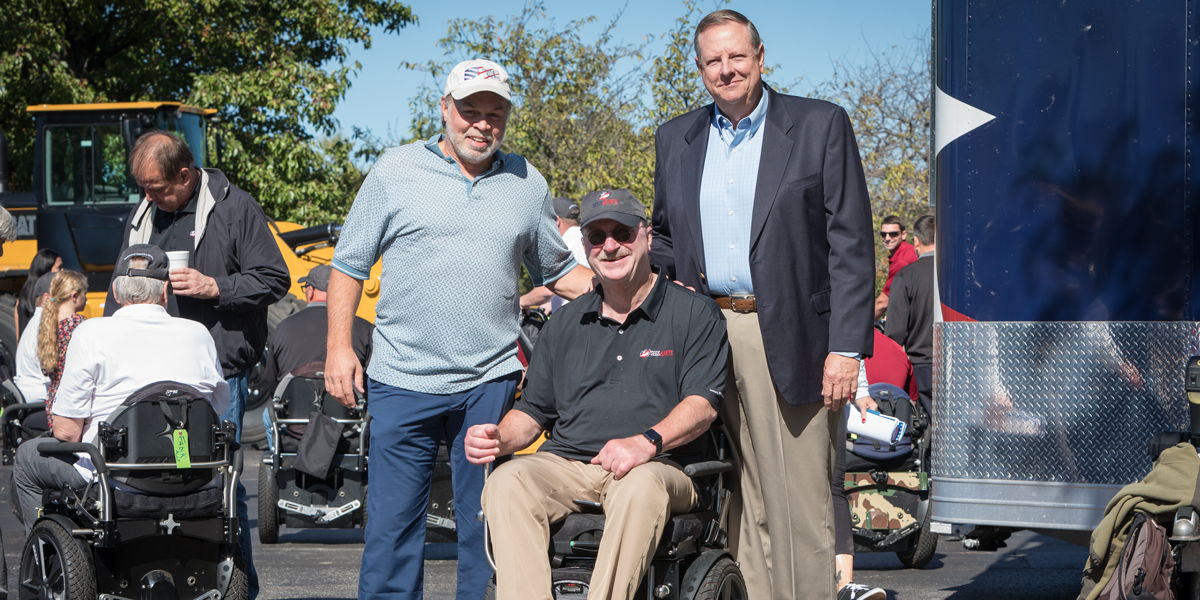Mobility for Disabled Veterans
On July 25, 1998, Jerry Kerr (University of Missouri, 1977) went from being a physically active CEO of a national home-building and real estate development corporation, an avid outdoorsman, and pilot; to a spastic quadriplegic when a diving accident shattered his C-4 vertebrae. He was told he would never again move from the neck down.

Gamma Kappa Chapter brothers from the University of Missouri Geoff Greenwood (1976), Jerry Kerr (1977) and Jim Chambers (1974).
His life changed, and he embraced the reset button and decided to help people with disabilities. “I had an opportunity, and was blessed financially, to be able to pursue a different path,” said Kerr.
Kerr candidly recalls how before he broke his neck, he questioned engineers who carved out space for handicap parking at one of his real estate developments. “They had taken what I thought was a huge section of the recreational facility and had to redesign some of the playgrounds and I said, ‘What are you doing?’ They said, ‘We had to make room for handicapped parking.’ I said, ‘What is somebody in a wheelchair going to be doing in my recreational facility?’”
Within a few weeks, he found himself in a wheelchair with a changed perspective. Following a rigorous physical therapy schedule, although neurologically impaired from the neck down, he regained the ability to stand briefly. In early 2003 he began using a Segway, a two-wheeled, self-balancing scooter, as his primary means of mobility.
In 2004 Kerr founded Disability Rights Advocates for Technology (DRAFT) to advocate for the adoption of universally designed technology solutions believing such solutions were the only sustainable approach to continuous improvement of quality of life for people with disabilities. He knew the benefits of dynamic stabilization, the technology used by the Segway to bring mobility to those with disabilities, and he saw the impact this emerging technology could have on veterans who were wounded in battle.
Inspired by injured veterans he met Kerr worked with DRAFT to develop the Segs4Vets program; a non-profit organization started as a grass-roots effort by volunteers to assist veterans with a permanent disability on the path of independence by providing Segways.
Kerr enlisted the help of his friend, General Eberhart who was retiring as commander of the North American Aerospace Defence Command and learned there would be hurdles. “It's not easy to give things to people who are in the military, because of ethics regulations. We found out we were prohibited from giving anyone who was active duty military anything over $50 or an aggregate amount annually of more than $1,000,” said Kerr.
That infuriated him, but he was determined to find a way to get Segways to veterans. He called Delt brother Dave Bell (University of Missouri, 1975). Bell, had been president of Gamma Kappa Chapter when Kerr was a freshman at the University of Missouri. The two had minimal contact since graduation, but Kerr knew that Bell had been a Judge Advocate General Colonel before retirement, so he sought his advice.
Bell, who remains involved in the Segs4Vets program 13 years later, helped navigate a minefield of red tape, getting clearance in 2006. “We ultimately became the only organization to receive a blanket waiver from the ethics regulations that inhibit those ethics gifts in excess of $50 and our particular gift is between $9,500 and $15,000 for each of the individuals we serve,” said Kerr.
Every case Kerr encounters is different. The need is apparent, but sometimes disability is not apparent. He cites a Navy corpsman who was injured while serving with the Marines. “If you saw him, there's not a blemish on his body. Nothing. But when he was in Iraq, he got in poison gas, and it scarred his lungs to the point he can't walk 100 feet,” Kerr said.
The program has grown to include the ALLY chair, a wheelchair built on a Segway platform. “Our job is to make sure that we have met the unmet needs of those individuals so that they can ultimately live a joyful life or engage with their communities and families,” said Kerr. The ALLY chair was another way he could make that happen.
“You probably never met a guy who is cut off at the waist,” Kerr said. “Has nothing. If you did meet him, you probably couldn't imagine there's any way he could ever be happy. We put this cat in this ALLY chair, and he had a grin as big as Texas, and he took off. He used it for about 20 minutes going all over the place. I finally said to him, "Hey brother, you’ve got to transfer back in your wheelchair and give another guy a chance." He cursed and said, "You're never getting this thing out of my hands."
Since 2005 Segs4Vets has awarded Segways and ALLY chairs mobilizing more than 1,700 men and women of the United States military who have sustained severe injuries.
Several fraternity brothers support Kerr’s work with Segs4Vets including Stephen Kling (University of Missouri, 1976) “There are a plethora of them that are benefactors and donors. It's a journey that has been very, very enriching,” said Kerr. “Those relationships you build as an undergraduate are not always apparent to a 22-year-old, but as a 60-year-old or a 50-year-old or a 45-year-old, you realize that's something you can really reach back and utilize. It's been an extraordinary gift to get to share that with the guys that I went to school with. The truth is, that without my Delt involvement I don't know if we would have gotten where we are today without that assistance and help, particularly from Dave Bell and Steve Kling,” said Kerr.
